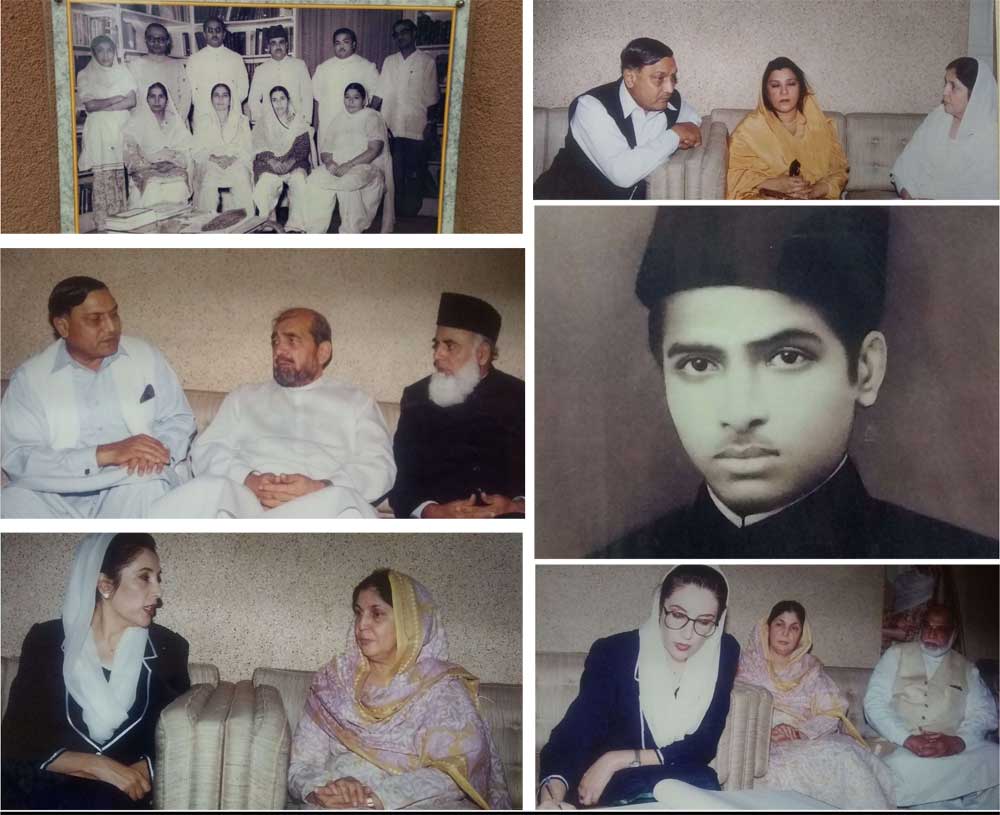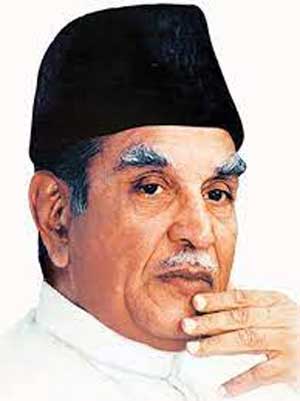
Hamdard University in pursuit of excellence, founded by Shaheed Hakim Mohammed Said in 1991
Shaheed Hakim Mohammed Said (1920-1998) established Hamdard Pakistan in 1948. Within a few years, the herbal medical products of Hamdard became household names. The phenomenal business success of Hamdard brands is a legendary part of the business history of Pakistan. The name Hamdard however acquired a still wider meaning, when Hakim Mohammed Said founded Hamdard University in 1991.
The establishment of a university which could enliven the intellectual tradition of the educational institutions of the golden era of Muslim civilization had always been his most cherished dream. In fact, it was the central point towards which all his endeavors were directed. The actual appearance of the university was just the culmination of a long dedicated and continued effort spanning his whole life.
However, apart from being a great educational leader, Hakim Mohammed Said was also one of the finest exponents of eastern medicine, who had treated millions of patients from all over the world including Pakistan, Europe, Africa and the Middle East by the time of his martyrdom (Shahadat) in October 1998.
In the fifty years of his active career as a practitioner of Greco-Arab medicine par excellence, Hakim Mohammed Said also achieved international fame as a scholar and researcher in medicine in recognition of his meritorious services and scholarly achievements when he was awarded Nishan-e-Imtiaz (Posthumous) by the Government of Pakistan in 2002.
As a prolific writer, he had to his credit a large number of books and articles. He edited many research journals and periodicals on medicine, history and Islam. Hakim Mohammed Said also created two very widely attended national forums: Hamdard Shura (for leaders of public opinion) and Naunehal Assembly (for children).
He attended and read papers at numerous conferences all over the world and organized a number of international conferences for promotion of science in Pakistan in collaboration with national and international organizations including UNESCO and WHO.
He also held important offices and memberships of dozens of national and international organizations related to education and health care, the fields to which his contributions are universally acknowledged.
A man of Herculean intellectual and organizational capabilities, Shaheed Hakim Mohammed Said will be remembered most for creating Hamdard University, which he stewarded to appear as one of the top institutions of higher education and learning in Pakistan.
How does one sum up a person who was larger-than-life? This couplet of the great poet Mirza Ghalib reminds me of the late Hakim Said on his 21st death anniversary (Oct 17). “If I ever get a chance I would ask earth, ‘Oh miser, what did you do with all the priceless treasures that were entrusted to you…”
Said was a great scholar, philanthropist and Governor of Sindh (1993-1996). He wrote more than 200 books on medicine, philosophy and science.
He met his untimely death in 1998 when he was attacked by a group of assailants on his way to oversee and experiment at Hamdard labs in Karachi.
In line with Hakim Said’s vision ‘Love Pakistan, Build Pakistan’, Hamdard is on a mission to make the country cleaner and greener with its Tree Plantation Drive. Late Hakim Said was among those intellectuals of the nation whose martyrdom 20 years back caused a grave loss to the people of Pakistan.
Late Hakim Said migrated to Pakistan from India on January 9, 1948 and launched services for the people of Pakistan in Karachi in a small rented building. Through his sustained efforts, they added, he was able to set up welfare institution Hamdard Foundation Pakistan which became synonymous with the quality herbal medicines not only in Pakistan but abroad as well. He had an unmatched personality and wanted his thoughts to take a practical shape in institution building.
The late scholar wanted a solution to the issues the country was faced with and that of the Muslim nation and made efforts to have them solved. Late Hakim Said visited several countries and highlighted these issues not only at the World Health Organisation, the United Nations but also other international forums.
Institutions such as Madinatul Hikma and Baitul Hikma set up by late Hakim Said in the port city of Karachi to spread standard education at various grades and at different levels. These institutions have research-based papers and proceedings of the international sessions which continue to serve as guidelines for all of us to this date.
A true scholar, writer, intellectual, innovator, entrepreneur and a philanthropist, Hakim Muhammad Said is alive as an amazing person of diverse abilities in memories of Pakistan even years after his tragic murder in 1998.
Hakim Said, as he was popularly known established Hamdard Dawakhana, from the institution his father created in India before partition. His organization which was mainly focused on traditional medicine later went on to diversify in fields of higher education, publishing and social work.
Hamdard is one of the largest production facilities of traditional or herbal medicines in Pakistan. Hakim Said’s work in reviving traditional medicine is considered to be pioneering in contemporary times because he established on modern footings and got it recognized by established bodies like World Health Organization (WHO).
Hakim Said was always optimistic and enthusiastic about Pakistan and what all this country has to offer. Hakim Muhammed Said was born in Delhi, British Indian Empire in 1920 to an educated and religious Urdu-speaking class family. His ancestors came from Kashgar (now Kashi, Xinjiang, China) to the Indian subcontinent, in the reign of the Mughal emperor, Shah Alam. They first stayed at Peshawar for about eighteen years, then moved to Multan and lastly settled down at Delhi.
His forefathers and family had been associated with the herbal medicine business and had established the Hamdard Waqf Laboratories in India before 1947, which today has emerged as one of the largest manufacturers of Unani medicines in the world.
Said attended the local school where he learned Arabic, Persian, Urdu, and English and studied the Quran. At age 18, Hakim Said went on to attend the University of Delhi in 1938. There, he obtained a B. Pharmacy degree and a Bachelor of Science degree in medicinal chemistry in 1942.
After his undergraduate education, he joined Hamdard Waqf Laboratories as a junior researcher and participated in herbal quality control while formulating medicines. In 1945, Saeed attended the post-graduate course and obtained a master’s degree in pharmacy from the same institution. Before 1947, Hakim Saeed was also involved in the Pakistan Movement activities.
Following his settlement in Pakistan, Hakim Said began practicing medicine and continued to research in eastern medicines. Having established the Hamdard Laboratories in 1948, Saeed was one of the driving forces in Pakistan for engaging in the research in medical biology and medicine.
In 1953, after his doctorate degree, Said joined the Sindh University as the Associate Professor of Pharmacy and taught courses in organic chemistry. In 1963, Saeed resigned from his position because of differences with the Federal government. In 1985, Hakim Mohammed Said founded Hamdard University, where he served as its first Vice-Chancellor and as a Profe`ssor.
The crowning activity of his life is the establishment of Madinatul Hikma campus in Karachi. It comprises Hamdard University with such institutes as Hamdard College of Medicine and Dentistry, Hamdard Al-Majeed College of Eastern Medicine, Hafiz Muhammad Ilyas Institute of Herbal Sciences, Hamdard Institute of Education & Social Sciences, Hamdard Institute of Management Sciences, Hamdard Institute of Information Technology, Hamdard School of Law, Faculty of Engineering Science & Technology, Hamdard Public School and Hamdard Village School. Baitul Hikmah (the Library) is also a constituent part of Madinatul Hikma. This is one of the biggest and best-stocked libraries of Pakistan.
Hakim Said wrote, edited or compiled over 200 books and journals in Urdu and English on Islam, Education, Pakistan, Science, Medicine and Health. Besides writing travelogues of countries he visited, he also wrote books especially for youth and children.
He also edited some journals such as Hamdard Islamicus, Hamdard Medicus, Journal of the Pakistan Historical Society “Historicus”, Hamdard-e-Sehat and Hamdard Naunehal. For several years he was also the Editor of Payami, the Urdu edition of UNESCO’s journal Courier.
Said participated in various international conferences on medicine, science, education and culture and travelled widely to many countries of the world. While in Pakistan, he organized numerous international and national conferences on topics of prime importance.








